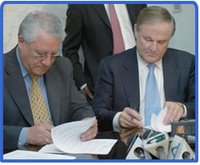Not much financial information about WGTL is available, given that it is a privately-held company (meaning that they don't trade their stock in any exchange and are not regulated by the Securities and Exchange Commission). However, there are some precedents to their activities.
The company was founded in 2000, according to a somewhat obscure UFTO Note[2] :
"Their [business] plan is to acquire ownership rights (in some cases production rights) to certain stranded gas fields at deeply discounted prices, and capitalize on
opportunities that now exist to convert these "stranded" natural gas fields into
synthetic petroleum products.Why don't the major [oil & gas companies] do this themselves? They do hold on to larger fields and may eventually develop them as LNG sources (or increasingly, with GTL), but they have no interest in smaller fields, e.g. under 3 tcf. This leaves a huge opportunity for players like World GTL. In fact, majors have already said they'd license their GTL technology and help with plant financing. (...) Turning Stranded Gas into Proven Oil Reserves World GTL has come up with an interesting strategy. Once the development is done on a project (i.e. secure gas rights, do site plan, license technology, do preliminary engineering, arrange financing, sales agreements, etc.) previously stranded gas reserves with little to no value will essentially have been converted to "in the ground" gasoline and diesel inventories which can be easily monetized in the international oil market. (...)"
World GTL, has had successes in the past, they developed one of the contintent' first GTL plants in partnership with Petrotrin, the Trinidad & Tobago petroleum company (which took one third of the equity in the project) and Guardian Holdings which took an equity stake in the project through its alternative energy Prometheus Fund .
As far as management goes, the company was founded by a number of former executives of some major oil companies, many of whom currently have a management position, including:
- Gordon H. Barrows, Chairman. Mr. Barrows has advised the United Nations, the World Bank and numerous governments and petroleum companies on petroleum matters. He is also Chairman of the Barrows Company, an international petroleum information company.
- David Loring, President and Chief Executive Officer. Previously involved in petroleum development and production projects with ARCO and major international projects with the General Motors Corporation.
- James Higbee, Vice President, International. Previously Managing Counsel for Squire, Sanders & Dempsey in Almaty, Kazakhstan; prior to that worked 18 years at ARCO, including as Director, International Negotiations and Contracts.
- Peter Tijm, Vice President of Technology. Twenty-eight years with Shell, including the Bintulu GTL plant.
- Leigh Noda, Chief Operating Officer. Mr. Noda has over 30 years of experience in the management of international petroleum refining operations with ARCO.
Notes and Sources:
[1] "Gas-to-Liquids"is a refining process that converts natural gas or other hydrocarbons into diesel fuel. It's a somewhat costly process that yields a cleaner "greener" fuel. Given Bolivia's diesel refining deficit and considerable demand -currently supplemented by imports from Argentina and Venezuela- the option of adopting the GTL method has been studied for many years.
[2] UFTO is a California-based advisory group that conducts "studies on behalf of a select group of energy utilities and vendors, to seek out technologies of interest and to facilitate collaborations among utilities, government and private companies." The complete article is found here, as of May 16, 2006.
My Hoovers and LexisNexis searches are yielding little results, this is it for today.
Company Websites: YPFB
Tags: Bolivia,Bolivian, oil, GTL, World GTL.





No comments:
Post a Comment